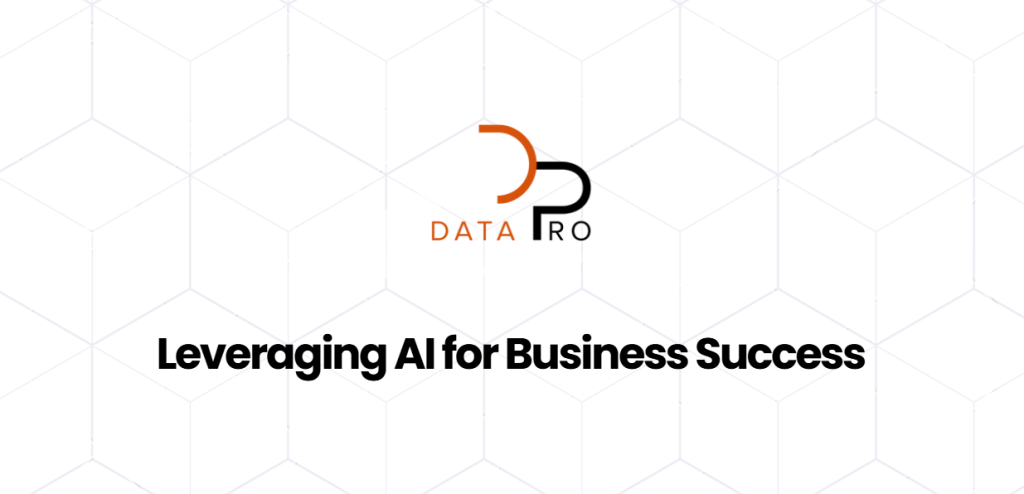
Leveraging AI for Business Success
Artificial Intelligence (AI) is revolutionizing business operations, offering companies innovative ways to enhance efficiency, make data-driven decisions, and stay ahead in competitive markets. Organizations that strategically adopt AI can streamline workflows, improve customer experiences, and drive profitability. This article explores how AI solutions are transforming businesses through real-world success stories and actionable strategies.
Leveraging AI for Data-Driven Decision Making
Modern businesses rely on data for strategic decision-making, and AI has emerged as a powerful tool for extracting insights from large datasets. AI-driven analytics platforms help organizations identify trends, optimize operations, and make real-time, informed decisions.
For example, AI-powered business intelligence tools can process vast amounts of data to generate accurate forecasts and personalized customer insights. By integrating AI with CRM systems, companies can enhance customer engagement and increase conversion rates. AI’s ability to detect patterns in consumer behavior allows businesses to tailor their marketing strategies effectively, increasing customer loyalty and lifetime value.
Moreover, AI-driven sentiment analysis helps organizations understand customer emotions and opinions by analyzing feedback from social media, reviews, and customer interactions. This enables businesses to address concerns proactively and refine their offerings to meet evolving customer needs.
AI-Enabled Workflow Automation
Automation powered by AI is transforming how businesses operate. Robotic Process Automation (RPA) enables organizations to automate repetitive tasks such as invoice processing, customer support, and HR functions. This not only reduces costs but also allows employees to focus on high-impact initiatives.
For instance, an e-commerce company using AI-driven chatbots reduced response times by 70%, leading to improved customer satisfaction and operational efficiency. Additionally, AI-powered document processing tools can extract and analyze data from contracts, invoices, and reports, significantly reducing manual effort and errors.
Furthermore, AI enhances collaboration by automating meeting scheduling, managing emails, and summarizing key discussion points. AI-driven project management tools assist in resource allocation, ensuring optimal efficiency across teams.
Predictive Analytics for Market Insights
AI-Powered Demand Forecasting
Predictive analytics helps businesses anticipate trends and customer demand. AI algorithms analyze historical sales data, economic indicators, and seasonal trends to provide accurate forecasts, allowing businesses to optimize inventory management and reduce waste.
A global retailer leveraged AI-driven forecasting to reduce stockouts by 30% and minimize excess inventory, leading to improved efficiency and customer satisfaction. This predictive capability also helps businesses plan marketing campaigns by identifying peak sales periods and customer preferences.
Beyond retail, AI-powered predictive analytics is transforming industries like healthcare and finance. Hospitals use AI to forecast patient admissions and optimize staff allocation, while financial institutions utilize AI to predict market trends and manage investment risks.
Personalizing Customer Experiences with AI
AI-driven personalization enhances customer experiences by analyzing browsing history and purchase patterns. Recommendation engines powered by AI help businesses increase engagement and drive sales.
Streaming platforms like Netflix and Spotify use AI to deliver personalized content, improving retention rates. Similarly, e-commerce companies report up to a 35% revenue increase from AI-powered recommendations. AI chatbots equipped with natural language processing (NLP) enhance customer interactions by providing instant support and personalized responses.
Moreover, AI-driven A/B testing enables businesses to experiment with different website layouts, product descriptions, and promotional offers, ensuring optimal user engagement. AI also powers voice assistants, allowing businesses to offer hands-free customer support and seamless interactions.
AI in Business Model Innovation
AI-Driven Competitive Intelligence
AI helps businesses gain a competitive edge by tracking industry trends, competitor activities, and market shifts in real time. AI-powered analytics tools aggregate data from multiple sources to deliver actionable insights.
For example, a financial services firm used AI-driven intelligence to monitor investment trends, leading to a 15% market share increase within a year. AI also assists businesses in tracking competitor pricing strategies, allowing them to adjust their own pricing dynamically to remain competitive.
Furthermore, AI-powered social listening tools analyze public sentiment about brands, enabling companies to refine their messaging and address potential reputation risks proactively.
AI-Powered Dynamic Pricing
AI optimizes pricing strategies by analyzing market conditions, competitor pricing, and consumer behavior. Dynamic pricing models adjust prices in real time, maximizing revenue while remaining competitive.
An airline company implementing AI-driven pricing saw a 12% revenue boost while maintaining affordability for customers. Similarly, e-commerce giants like Amazon leverage AI to adjust product prices based on demand fluctuations, competitor pricing, and customer purchase history.
Retailers use AI-driven pricing optimization to offer personalized discounts, encouraging customer retention and repeat purchases. AI also helps businesses identify the most effective discount strategies to maximize profits without eroding margins.
AI for Workforce Efficiency
AI in Talent Acquisition
AI-powered recruitment tools streamline hiring processes by analyzing resumes and matching candidates with job openings. AI-driven applicant tracking systems (ATS) help companies reduce hiring time and improve candidate quality.
A leading tech company leveraged AI hiring tools, reducing time-to-hire by 40% and improving the overall recruitment process. AI can also analyze interview performance using speech recognition and behavioral analysis, providing HR teams with deeper insights into candidate suitability.
Additionally, AI-driven employee engagement platforms assess job satisfaction levels and suggest strategies to enhance workplace morale, reducing turnover rates.
Enhancing Employee Productivity with AI
AI-driven virtual assistants improve productivity by managing schedules, automating administrative tasks, and providing instant access to relevant information. Organizations using AI-powered internal search engines report a 25% reduction in time spent searching for information, leading to increased efficiency.
Moreover, AI-powered learning platforms provide personalized training programs, helping employees upskill efficiently. AI-driven performance analytics also enable managers to track employee progress and optimize talent development strategies.
AI for Sustainable Business Growth
Optimizing Supply Chain Management with AI
AI enhances supply chain management by predicting disruptions, optimizing logistics, and improving supplier relationships. Machine learning algorithms help businesses adapt to market fluctuations and unforeseen challenges.
A manufacturing company using AI-powered supply chain optimization reduced operational costs by 18% while improving delivery timelines. AI also assists in route optimization for logistics companies, reducing fuel consumption and transportation costs.
By leveraging AI-driven sustainability analytics, businesses can reduce their carbon footprint by optimizing resource utilization and minimizing waste.
Strengthening Cybersecurity with AI
AI-powered fraud detection systems analyze transaction patterns to identify anomalies and prevent financial losses. Machine learning models continuously adapt to emerging threats, improving cybersecurity measures.
A major bank using AI-based fraud detection reduced fraudulent transactions by 35%, enhancing customer trust and security. AI-driven cybersecurity tools also detect phishing attempts, malware threats, and unauthorized access, ensuring robust protection against cyberattacks.
Implementing AI Successfully
Developing an AI Strategy
To integrate AI effectively, businesses should:
- Identify AI applications aligned with business goals.
- Invest in AI infrastructure and talent.
- Foster a culture of continuous learning and innovation.
Overcoming AI Adoption Challenges
Common challenges to AI adoption include resistance to change and data privacy concerns. Companies can address these by:
- Communicating AI’s role and benefits transparently.
- Implementing robust data governance policies.
- Providing AI training programs for employees.
Conclusion
AI is transforming the business landscape, offering opportunities for growth, efficiency, and competitive advantage. By strategically leveraging AI for decision-making, automation, and customer engagement, businesses can drive innovation and achieve long-term success in an increasingly digital world. As AI continues to evolve, organizations that embrace AI-driven transformation will maintain a strong competitive edge and unlock new avenues for sustainable growth.
Innovate With Custom AI Solution
- 12 Courtyard Pl,
Lexington, MA 02420 - (617)319-0174
- corp@dataprocorp.tech
